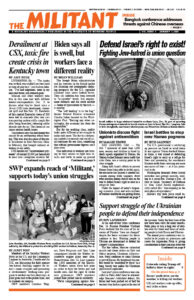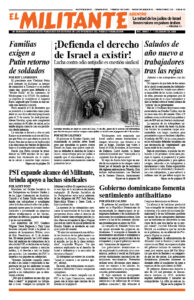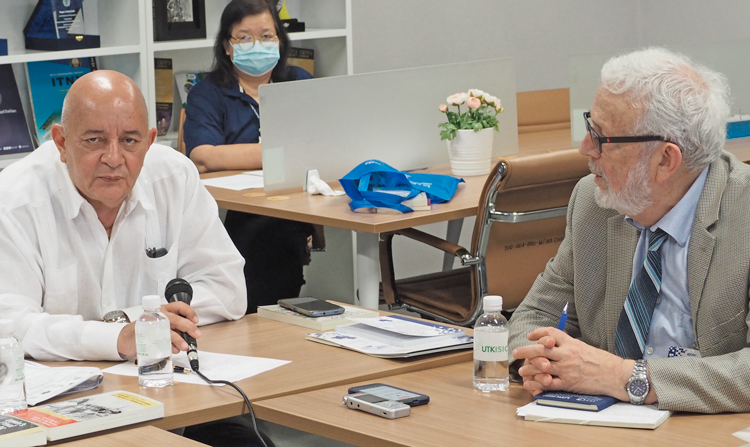BANGKOK — Since Our History Is Still Being Written: The Story of Three Chinese Cuban Generals in the Cuban Revolution was first published in 2005, the book has had a political impact in many parts of the world. The account by the three Cuban revolutionary leaders interviewed in its pages was central to the Dec. 10 workshop presentation by Steve Penner at the regional conference of the International Society for the Study of Chinese Overseas here.
Penner was standing in for Mary-Alice Waters, president of Pathfinder Press and the editor of the book, who was scheduled to speak but unable to make the trip.
“The Unique History of the Chinese in Cuba,” the title of the presentation, is true from several standpoints. It is unique not only due to the scale of the Spanish colonial government’s import of Chinese indentured workers into 19th-century Cuba, as well as the subsequent import of Chinese-born immigrants driven out of the United States by anti-Chinese laws and racist discrimination.
Most important, Penner said, the Chinese Cuban history is unique because of the “150-year continuity of revolutionary struggles in which Chinese Cubans played a major role.”
The three Chinese Cuban generals interviewed in the book — Armando Choy, Gustavo Chui, and Moisés Sío Wong — describe their lifelong participation in the Fidel Castro-led revolution, starting as teenagers in the battles that led to the 1959 overthrow of the imperialist-backed military dictatorship of Fulgencio Batista. They took leadership responsibilities in the consolidation and defense of the revolution, including the powerful land reform, triumphant mass literacy campaign and the wholesale expropriation of sugar plantations, banks and other properties of Cuban and U.S. capitalists.
Among these historic achievements, Penner said, were decisive steps to end “discrimination against Cubans who were black or Chinese.” Moisés Sío Wong had attended ISSCO’s 1999 conference in Havana, where he was asked about this by the organization’s then President Wang Gungwu. “Before the triumph of the revolution, we Chinese faced brutal discrimination and oppression,” Sío Wong answered. “The difference is that here a socialist revolution took place.
“The revolution eliminated discrimination based on the color of a person’s skin. Above all, it eliminated the property relations that create not only economic but also social inequality between rich and poor.”
“We’re going through a watershed in world politics that has been building up for years,” Penner said. “The outcomes of the wars being waged by Ukraine and Israel to defend their very existence will have enormous consequences for humanity.
“In their attempts to resolve the worldwide crisis of their capitalist system today,” Penner added, “the ruling rich use racism, chauvinism and xenophobia to try and divide and drive back working people. Ultimately, they’ll again turn to fascist violence and Jew-hatred to smash the working class when their rule is threatened.”
“In this world of deepening capitalist crisis and wars,” Penner said, more and more working people in North America and beyond are looking for political answers and for ways to fight effectively for their class interests and win. “The example of Cuba’s socialist revolution, and of Fidel Castro’s leadership in mobilizing workers and peasants to take control of their own destiny and extend a hand to working people worldwide, points the way forward.”
These conquests of the Cuban Revolution, Penner pointed out, are inter-connected with the earlier struggles for independence, sovereignty, human dignity, the abolition of slavery and of indentured servitude — in which Cubans of Chinese origin were engaged as combatants and leaders from the outset.
Alongside Penner on the workshop panel were Titiporn Siriphant Puntasen of Thailand’s Rangsit University and Xia Jiang of Huaquiao University in China. (See accompanying article on the ISSCO conference.)
Also participating in the workshop was Pedro Pablo San Jorge Rodríguez, Cuba’s ambassador to Thailand. As it happens, the ambassador recalled, “I had very close relations with one of these generals — Armando Choy.” San Jorge said he had worked alongside the Cuban general when Choy led the cleanup of Havana Bay and other development projects. Choy, like Chui and Sío Wong, shouldered a variety of responsibilities in addition to their decades of leadership in Cuba’s Revolutionary Armed Forces.
At the workshop, Titiporn Siriphant Puntasen said how impressed she was to hear for the first time about these decisive steps by Chinese Cubans in the Cuban Revolution. She was one of many participants who wanted to find out more.
At conference sessions and from a table in a book area at the ISSCO event, Pathfinder supporters sold all the copies of Our History Is Still Being Written in English they had brought as well as three in Chinese.


